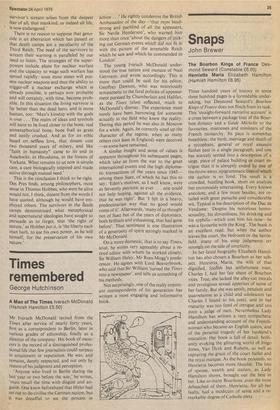Times remembered
George Hutchinson A Man of The Times lverach McDonald (Flemish Hamilton £5.50) Mr Iverach McDonald retired from the Times after service of nearly forty years, first as a correspondent in Berlin, later in various grades of editorship, finally as a director of the company. His book of memoirs is the record of a distinguished professional life that few journalists could surpass in attainment or reputation. He was, and remains, deeply respected, and not only by reason of his judgment and perception.
'Anyone who lived in Berlin during the last year or two before the war,' he writes, 'must recall the time with disgust and anguish. One knew beforehand that Hitler had set out to de-civilise the German nation, but it was dreadful to see the process in
action ...' He rightly condemns the British Ambassador of the day---`that most headstrong and purblind of all the appeasers. Sir Nevile Henderson', who warned him more than once 'about the dangers of picking out German events which did not fit in with the picture of the amenable Reich which he saw and which he commended to London'.
The young Iverach McDonald understood the true nature and menace of 'Nazi Germany, and wrote accordingly. This is more than could be said for his editor, Geoffrey Dawson, who was notoriously sympathetic to the fatal policies of appeasement pursued by Chamberlain and Halifax, as the Times (alas) reflected, much to McDonald's dismay. The experience must surely have been harrowing for someone actually in the field who knew the reality. During this period he was also in Moscow for a while. Again, he correctly sized up the character of the regime, when so many others (not least in England) were deceived —as some have remained.
A similar insight and sense of values is apparent throughout his subsequent pages, which take us from the war to the great international events and the high diplomatic transactions of the years since 1945— among them Suez, of which he has this to say: 'Eden's motives, as I well know, were as fervently patriotic as ever . . . one could not help hoping, against all the evidence, that he was right'. But 'I felt in a heavy; predestinarian way that no good would come of it'. Afterwards, 'many of us thought not of Suez but of the years of diplomacy, both brilliant and exhausting, that had gone before'. That sentiment is one illustration of a generosity of spirit strongly marked in Mr McDonald.
On a more domestic, that is to say Times, level, he writes very agreeably about a retired editor with whom he worked closely, Sir William Haley, Mr Rees-Mogg's predecessor. He agrees with Lord Beaverbrook, who said that Sir William 'turned the Times into a newspaper', and tells us something of his methods.
Not surprisingly, one of the really important correspondents of his generation has written a most engaging and informative book.


































 Previous page
Previous page